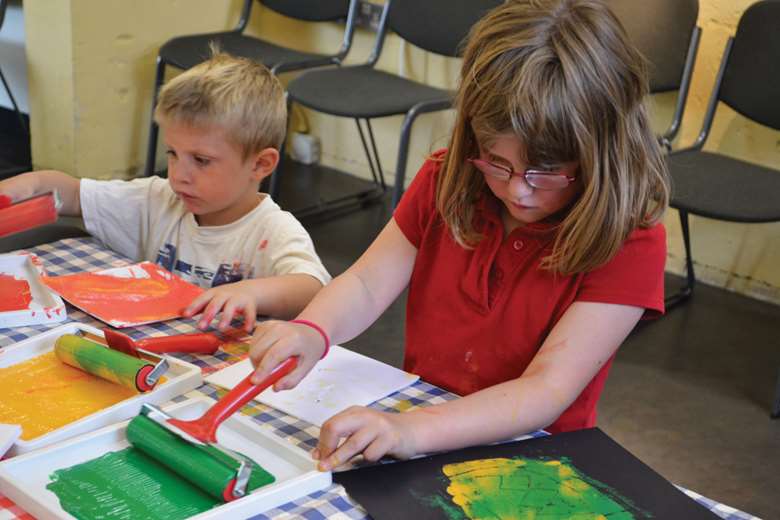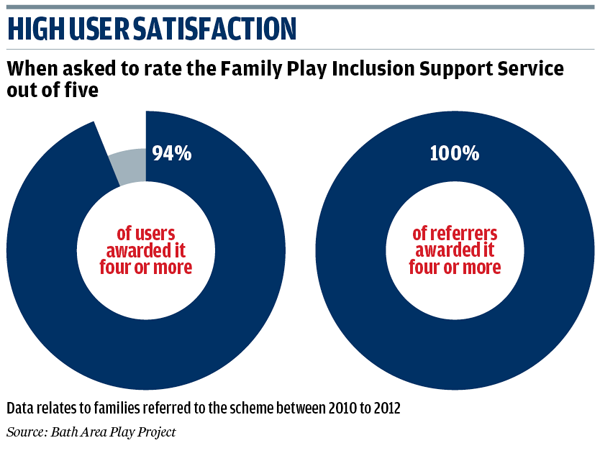How family bond is improved by play project
Emily Rogers
Tuesday, November 25, 2014
Play initiative helps to improve social skills for five- to 15-year-olds and build better relationships between the children and their parents.

Project
Family Play Inclusion Support Service
Purpose
To bring about positive change in the lives of children and their families using play as a catalyst
Funding
Around £150,000 a year, funded by a three-year grant from the Big Lottery Fund's Reaching Communities programme and by Bath and North East Somerset Council
Background
Bath Area Play Project has been providing holiday play schemes and other activities for children and teenagers for 35 years. In 2002, the government began to promote the creation of "extended schools". This new focus on extra-curricular activities prompted the charity to secure council funding for a play quality inclusion worker, to help engage children with additional needs in mainstream out-of-school activities. However, the organisation soon realised families of these children needed a dedicated service to help engage them in play.
Action
The Family Play Inclusion Support Service started to develop in 2006 and now has a team of seven play workers.
Five- to 15-year-olds are referred by professionals such as social workers, teachers and health visitors if they are socially isolated, have poor attachment, lack play opportunities, rarely play with friends, or if there are concerns about their social and emotional development. Parents or carers can also request the support themselves.
Every referral leads to an initial home visit by one of the team, who gets to know the family and builds an understanding of the barriers to the positive outcomes they want.
Families are often socially isolated and sometimes grappling with issues such as substance misuse, poor communication skills, difficulties in relationships and problems managing their children's behaviour. The play worker compiles a "play action plan", outlining simple steps for positive change.
Charity director Caroline Haworth describes the relationship between the play worker and family as "the key to unlocking positive outcomes, such as improved behaviour, confidence and self-esteem". They offer one-to-one play sessions with the child, sometimes with parents' involvement, or they may help a child join a youth club.
Families may be invited to one of the charity's "playful families" groups, where they can bond with each other through play and develop their social skills.
The team initially uses play as a non-threatening way of engaging families. But by observing their children play and discussing their behaviour with play workers, parents start to understand their children better and learn how they can strengthen their relationship with them.
This, according to Haworth, is "incredibly powerful". She explains: "For a lot of children, much of their anger and frustration is down to the fact they are not able to communicate or express what they are feeling, or what life is like."
Play workers also offer parents strategies for improved behaviour management, improved attachment and reduced social isolation.
"Some parents have not necessarily had very strong play experiences themselves and don't have the confidence to do things with their children they'd like to," says Haworth. "We could make greater headway by just working with the child, but there's no legacy with that. It has to be something making a difference not just to the child, but to the whole family."
The play workers also provide advocacy at meetings such as child protection conferences. "Quite often, no other professionals see what we see," says Haworth.
Outcome
An internal evaluation published by Bath Area Play Project in February 2013 shows 90 referrals were made to the service between 2010 and 2012. Of 32 families asked to rate it between one and five, 30 awarded it four or above. They valued it as being non-judgmental, providing a listening ear, motivating them to change things and helping them improve their relationship with their children.
Of 20 referrers asked to rate the service, all gave it four or above, with one social worker describing it as "an invaluable service that needs to continue to expand".
Forty-seven children were found to have better resilience, understood how to keep themselves safer and had better social interaction with their peers after their involvement.
The evaluation found in all cases, the relationship and attachment between parents and children "improved dramatically".

of users awarded it four or more
94%
of referrers awarded it four or more
100%
Data relates to families referred to the scheme between 2010 to 2012
Source: Bath Area Play Project
]]




